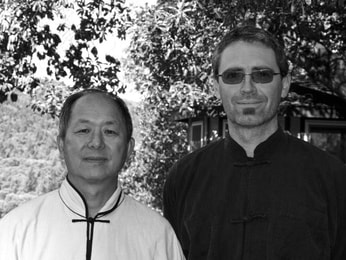
I am Sifu (teacher) Phil Dunwoody. I am pictured to the right of Dr. Yang in the photo. He and his disciples (senior students) have been my Taijiquan (Tai Chi) teachers since 2009.
I have studied martial arts since 1996 and Tai Chi since 1998. Initially, I focused on studying Goju-Ryu Karate and dabbled in Yang-style Taijiquan (Tai Chi). Over time, I became more and more interested in Taiji. The softness of the movements, fullness of the martial art, and rich intellectual tradition rooted in Chinese philosophy all appealed to me. I've been teaching Taiji since 2009.
Because of my background in both external (the hard style of Goju Karate) and internal (the soft style of Taijiquan) martial arts, I have a well-rounded understanding of the movements and their varied martial applications. Taijiquan and Goju-Ryu Karate are both short-range martial arts that emphasize sticking to, and controlling your opponent through joint locks, strikes, and takedowns. Both Goju and Taiji have a push-hands tradition.
I was first given permission to teach Taijiquan in January of 2009 by Zong, Yongze. I previously taught the popular 24 posture Yang style form which I learned from Zong Yongze while Zong Yongze was staying in Huntingdon, PA with his family. Zong, Yongze’s teacher is Wang, Hongquan (Chair of Beijing Tongzhou District Marshall Arts Association).
I became a branch of YMAA on 9/1/2012, after passing my second-stripe test under Dr. Yang. I passed my third-stripe (Assistant Instructor) test under Dr. Yang in August of 2015. I am currently focused on teaching the traditional Yang-style Taiji long form, push hands, saber, and sword as taught by Dr. Yang, Jwing-Ming. I'm also a Certified Tai Chi Instructor - Level III, through the American Tai Chi and Qigong Association.
Because of my experience as psychologist and college professor, I apply learning theory to the study and practice of martial arts. It can be difficult for the beginner to know if they are getting quality instruction. There are two criteria you should use in picking a martial arts school.
First, does the instructor come from a respected lineage and are they affiliated with a respected martial arts organization? I am fortunate to be affiliated with YMAA and have studied directly with Dr. Yang and his senior students. Dr. Yang is a world-renowned martial artist and living legend. I am truly humbled and grateful to have had opportunities to study with him.
Second, do you feel comfortable taking classes with the instructor? My classes are open, friendly, and non-threatening. My students have ranged from teenagers to those in their 70s. All are welcome. I am here to inspire you and train you, not to tear you down.
To learn more about my perspective on Taijiquan, I recommend reading my article about the relationship between the study of Taijiquan and traditional East-Asian values: http://broncoscholar.library.cpp.edu/bitstream/handle/10211.3/133652/Dunwoody79-95.pdf?sequence=1
I have studied martial arts since 1996 and Tai Chi since 1998. Initially, I focused on studying Goju-Ryu Karate and dabbled in Yang-style Taijiquan (Tai Chi). Over time, I became more and more interested in Taiji. The softness of the movements, fullness of the martial art, and rich intellectual tradition rooted in Chinese philosophy all appealed to me. I've been teaching Taiji since 2009.
Because of my background in both external (the hard style of Goju Karate) and internal (the soft style of Taijiquan) martial arts, I have a well-rounded understanding of the movements and their varied martial applications. Taijiquan and Goju-Ryu Karate are both short-range martial arts that emphasize sticking to, and controlling your opponent through joint locks, strikes, and takedowns. Both Goju and Taiji have a push-hands tradition.
I was first given permission to teach Taijiquan in January of 2009 by Zong, Yongze. I previously taught the popular 24 posture Yang style form which I learned from Zong Yongze while Zong Yongze was staying in Huntingdon, PA with his family. Zong, Yongze’s teacher is Wang, Hongquan (Chair of Beijing Tongzhou District Marshall Arts Association).
I became a branch of YMAA on 9/1/2012, after passing my second-stripe test under Dr. Yang. I passed my third-stripe (Assistant Instructor) test under Dr. Yang in August of 2015. I am currently focused on teaching the traditional Yang-style Taiji long form, push hands, saber, and sword as taught by Dr. Yang, Jwing-Ming. I'm also a Certified Tai Chi Instructor - Level III, through the American Tai Chi and Qigong Association.
Because of my experience as psychologist and college professor, I apply learning theory to the study and practice of martial arts. It can be difficult for the beginner to know if they are getting quality instruction. There are two criteria you should use in picking a martial arts school.
First, does the instructor come from a respected lineage and are they affiliated with a respected martial arts organization? I am fortunate to be affiliated with YMAA and have studied directly with Dr. Yang and his senior students. Dr. Yang is a world-renowned martial artist and living legend. I am truly humbled and grateful to have had opportunities to study with him.
Second, do you feel comfortable taking classes with the instructor? My classes are open, friendly, and non-threatening. My students have ranged from teenagers to those in their 70s. All are welcome. I am here to inspire you and train you, not to tear you down.
To learn more about my perspective on Taijiquan, I recommend reading my article about the relationship between the study of Taijiquan and traditional East-Asian values: http://broncoscholar.library.cpp.edu/bitstream/handle/10211.3/133652/Dunwoody79-95.pdf?sequence=1


